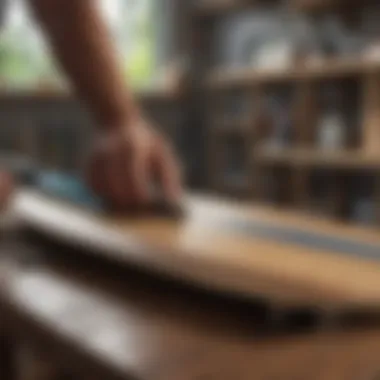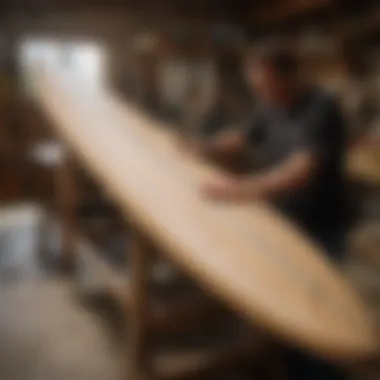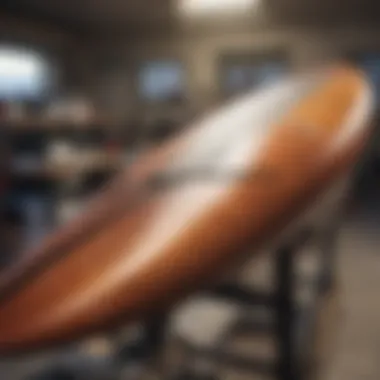Unveiling the Intricacies of Surfboard Shaping Racks: A Comprehensive Guide


Surfboarding Techniques
Surfing is not just a sport - it is a way of life, a communion with the power of the ocean. Before embarking on the gripping ride, understanding some key surfboarding techniques is indispensable. From mastering the art of catching and riding different types of waves to executing precise maneuvers like the pop-up technique, bottom turn, duck diving, and cutback, each aspect contributes to the symphony of skill and finesse required in the world of surfing.
Types of Waves
Variety is not merely the spice of life, it is the essence of surfing. Waves, the heartbeat of any surfer, come in diverse forms - from the powerful and barreling to the gentle and rolling. Each wave type demands a distinct approach and technique, requiring surfers to adapt swiftly to the ever-changing aquatic landscape.
Pop up Technique
The quintessential moment in a surfer's journey - the pop-up. This seamless transition from lie-down to standing position is more than just a physical movement; it is a mental preparation, a synchronization of body and board with the rhythm of the wave. Perfecting the pop-up technique is pivotal to catching waves efficiently and maintaining balance on the surfboard.
Bottom Turn Maneuver
The bottom turn - a fundamental maneuver in a surfer's arsenal. This elegant pivot at the bottom of the wave sets the stage for dynamic and fluid surfing. By harnessing the energy of the wave through a precise bottom turn, surfers can carve graceful lines and unleash their creativity on the canvas of the water.
Duck Diving
Navigating through the tumultuous embrace of a breaking wave requires finesse and strategy. Duck diving, a specialized technique, empowers surfers to submerge beneath incoming waves with poise and efficiency. Mastery of the duck diving skill enhances a surfer's ability to confidently tackle more challenging surf conditions.
Cutback
Like a brushstroke on a wave's canvas, the cutback is a moment of artistry and control. This graceful maneuver involves a swift turn back towards the breaking part of the wave, allowing surfers to maintain speed and flow across the face of the wave. A well-executed cutback not only showcases skill but also maximizes the surfing experience.
Introduction to Surfboard Shaping Racks
Surfboard shaping racks are indispensable tools in the realm of crafting personalized surfboards. These specialized racks serve as the cornerstone for shaping surfboards with precision and efficiency. Through a detailed examination of these racks, we unveil the intricate world of surfboard customization and wave-riding perfection.
Understanding the Purpose
Creating a Stable Workstation
The essence of a stable workstation lies in its ability to provide a secure platform for shaping surfboards. A stable workstation ensures that every movement and adjustment during the shaping process is executed with utmost accuracy. The key characteristic of a stable workstation is its robust construction, which minimizes any vibrations or wobbling that could compromise the final surfboard shape. Despite its simplicity, the stability offered by this workstation is unparalleled, making it a favored choice among surfboard shapers seeking impeccable results.
Ensuring Precision and Accuracy
Precision and accuracy are non-negotiable elements when it comes to surfboard shaping. An essential aspect of the process, ensuring precision and accuracy guarantees that each cut and contour align perfectly with the shaper's vision. The defining feature of this aspect is the meticulous attention to detail that is upheld throughout the shaping process. While providing a high level of accuracy, this approach also demands unwavering focus and skill, offering both advantages and challenges in the pursuit of flawlessness.
Historical Evolution


Origins of Shaping Racks
The origins of shaping racks can be traced back to the early days of surfboard crafting when artisans realized the need for a stable platform to shape boards. A key characteristic of these early racks was their simplistic yet sturdy design, reflecting the straightforward nature of surfboard shaping in its infancy. Despite their rudimentary nature, these racks played a fundamental role in shaping the evolution of surfboard design, laying the groundwork for the innovative racks we use today.
Advancements Over Time
As surfboard shaping evolved, so did the racks used in the process. Advancements over time brought about significant changes in the design and functionality of shaping racks. The key characteristic of these modern racks is their adaptability and precision, allowing shapers to create intricate board designs with unprecedented accuracy. However, these advancements also introduce complexity and technicality, adding a layer of challenge to the shaping process while enhancing the final product.
Significance in Surfboard Crafting
Impact on Board Customization
The impact of shaping racks on board customization cannot be overstated. By providing a stable and controlled environment for shaping, these racks empower shapers to explore limitless design possibilities. The key characteristic of this impact is the freedom it offers in experimenting with different shapes and styles, fostering innovation in surfboard crafting. Yet, this freedom also poses challenges in decision-making, requiring shapers to balance creativity with practicality to achieve remarkable customizations.
Role in Achieving Desired Shapes
The role of shaping racks in achieving desired shapes is fundamental to the surfboard crafting process. By offering a consistent platform for shaping, these racks enable shapers to translate their visions into tangible surfboard designs. The key characteristic of this role is the precision it brings to the shaping process, ensuring that every curve and angle is crafted to perfection. However, this precision also demands expertise and attention to detail, underscoring the craftsmanship and skill required in realizing desired shapes.
Types of Surfboard Shaping Racks
Surfboard shaping racks play a crucial role in the process of crafting personalized surfboards. Understanding the different types of surfboard shaping racks is essential for choosing the right equipment tailored to individual needs. This section delves into the importance of various types of surfboard shaping racks, highlighting their specific elements, benefits, and considerations.
Fixed Racks
Features and Functionality
Fixed racks offer stable support during the surfboard shaping process. Their rigid structure ensures precision and accuracy in shaping the boards. The key characteristic of fixed racks is their immobility, which provides a solid foundation for creating surfboards. This stability is a popular choice for shaping professionals due to its reliability in maintaining the desired shape of the board. However, the lack of adjustability may limit the versatility of fixed racks.
Pros and Cons
One of the main advantages of fixed racks is their robustness, offering dependable support for shaping activities. They are known for their durability and long-lasting nature, making them a cost-effective option in the long run. On the other hand, the immovable nature of fixed racks could be seen as a limitation, especially when working on different board shapes and sizes. The fixed design may not accommodate all shaping requirements, necessitating the use of additional tools in some cases.
Adjustable Racks
Flexibility in Usage
Adjustable racks provide flexibility in accommodating various board shapes and sizes. Their customizable elements allow surfboard shapers to adjust the rack according to specific requirements. The key characteristic of adjustable racks is their adaptability, enabling users to work on a range of surfboards with ease. This versatility makes adjustable racks a preferred choice for those looking to work on different board designs efficiently.
Precision Enhancements
Precision enhancements in adjustable racks contribute to achieving accurate shaping results. These racks come with features that facilitate precise measurements and adjustments, ensuring the desired outcome. The key characteristic of precision enhancements is their ability to fine-tune the shaping process, leading to high-quality surfboards. While the advanced features of adjustable racks enhance precision, some users may find them complex to operate initially.


Mobile Racks
Portability Benefits
Mobile racks offer the convenience of portability, allowing surfboard shapers to work in different locations. Their lightweight design and easy assembly make them ideal for on-the-go shaping sessions. The key characteristic of mobile racks is their mobility, enabling surfboard shapers to take their equipment wherever they go. This portability aspect is beneficial for those who prefer to shape surfboards in various environments.
Considerations for Stability
Despite their portability, stability is a crucial consideration when using mobile racks. Factors such as base support and construction materials impact the overall stability of these racks. The key characteristic of stability considerations is balancing portability with a sturdy foundation for shaping activities. While mobile racks offer flexibility in terms of location, ensuring stability during the shaping process is essential to avoid any mishaps.
Key Features of Surfboard Shaping Racks
In the realm of surfboard shaping, the selection of the right surfboard shaping rack plays a pivotal role in attaining precision and efficiency during the crafting process. The key features of a surfboard shaping rack encompass a range of elements that directly impact the quality and customization of the surfboard being shaped. Understanding these key features is essential for any surfboard shaping enthusiast looking to elevate their craft. By delving into the material composition, adjustability, stability, and versatility of shaping racks, craftsmen can refine their shaping techniques and produce boards that meet their exacting standards.
Material Composition
Wooden Racks
Wooden surfboard shaping racks hold a significant place in the world of surfboard crafting due to their natural stability and compatibility with hand-shaping techniques. The key characteristic of wooden racks lies in their ability to dampen vibrations, providing a steady platform for shaping intricate details on surfboards. Their inherent durability and resistance to corrosion make them a preferred choice for traditional craftsmen seeking an organic connection in their shaping process. However, wooden racks may require more maintenance compared to metallic alternatives, and their susceptibility to environmental factors like moisture and heat must be duly noted.
Metallic Racks
Metallic surfboard shaping racks offer exceptional strength and rigidity, ideal for precise shaping tasks that demand consistency and accuracy. The key characteristic of metallic racks is their robustness, ensuring minimal flex during the shaping process, leading to more refined outcomes. Their resistance to environmental degradation and ease of maintenance make them a practical choice for high-volume shaping operations. Nevertheless, metallic racks may lack the natural vibration dampening properties of wooden racks, impacting the 'feel' of the shaping process for craftsmen who value tactile feedback.
Hybrid Options
Hybrid surfboard shaping racks amalgamate the best of both wood and metal, offering a balance between stability and flexibility. The key characteristic of hybrid options is their versatility, accommodating a wide range of shaping styles and techniques. By combining the natural dampening properties of wood with the rigidity of metal, hybrid racks provide craftsmen with a harmonious shaping experience that blends tradition with modernity. However, the complexity of hybrid construction may lead to higher costs compared to individual wooden or metallic racks, urging craftsmen to weigh the benefits against their budget constraints.
Choosing the Right Surfboard Shaping Rack
Surfboard shaping racks are a crucial component in creating personalized surfboards. Selecting the ideal surfboard shaping rack can significantly impact the crafting process. Considerations such as stability, adjustability, and durability play a key role in determining the right fit for your shaping needs. Accuracy and precision are paramount when shaping surfboards, making the choice of shaping rack pivotal.
Assessing Your Shaping Needs
Frequency of Use
When evaluating your shaping needs, the frequency of use is a critical factor to consider. Depending on how often you engage in surfboard crafting, you may require a more robust and long-lasting surfboard shaping rack. Frequency of use dictates the sturdiness and reliability needed in the rack. Choosing a rack that can withstand frequent shaping sessions ensures consistency and quality in your surfboard creations. While high-frequency racks may have a higher initial investment, the long-term benefits in terms of efficiency and productivity are substantial.
Types of Boards Worked On


Considering the types of boards you work on is essential in selecting the right surfboard shaping rack. Different racks are designed to accommodate various board sizes and shapes. Whether you shape shortboards, longboards, or fish boards, ensuring that your rack can securely hold and provide adequate support for the boards is crucial. Versatility in board compatibility is advantageous, allowing you to work on a diverse range of surfboard designs. However, specialized racks for specific board types may offer enhanced stability and precision during shaping processes.
Budget Considerations
Balancing Cost and Quality
Balancing cost with quality is a significant aspect when choosing a surfboard shaping rack. While cost-effective options may be appealing, compromising on quality can impact the durability and performance of the rack. Investing in a high-quality shaping rack that aligns with your budget ensures longevity and functionality. Assessing the materials, construction, and features of the rack in relation to its cost is vital in striking the right balance between affordability and quality.
Long-term Investment
Viewing the purchase of a surfboard shaping rack as a long-term investment is paramount. A durable and versatile rack can serve you well for numerous surfboard shaping projects over the years. Consider the potential lifespan of the rack, its adaptability to different shaping requirements, and how it can grow with your craft. While a long-term investment may require a higher upfront cost, the value derived from a reliable and durable surfboard shaping rack far outweighs short-term savings.
User-Friendly Features
Ease of Assembly
The ease of assembly is a convenience factor that significantly impacts the efficiency of your shaping process. Opting for a surfboard shaping rack that is easy to set up and disassemble saves valuable time and effort, allowing you to focus more on the actual shaping work. Quick and straightforward assembly features contribute to a seamless workflow, especially if you frequently move or store your rack. Ensuring that the rack's assembly mechanisms are user-friendly enhances overall user experience and productivity.
Storage and Maintenance
Efficient storage and maintenance capabilities are essential considerations when selecting a surfboard shaping rack. Whether you have limited workshop space or require portability, choosing a rack that offers convenient storage options is advantageous. Features such as collapsibility, compact design, and protective coatings for rust prevention enhance the rack's durability and lifespan. Simplifying maintenance tasks through accessible components and materials minimizes downtime and ensures the rack remains in optimal condition for prolonged use.
Maintenance and Care Tips
As we embark on our journey through the fascinating realm of surfboard shaping racks, it becomes evident that understanding maintenance and care tips is paramount to ensuring the longevity and optimal performance of these essential tools. The meticulous care of surfboard shaping racks not only enhances their durability but also guarantees safety during the surfboard crafting process. Regular maintenance routines play a crucial role in preserving the integrity of the racks, preventing wear and tear that could compromise their functionality. To delve into the nuances of maintaining and caring for these indispensable tools is to elevate the craftsmanship and efficiency of surfboard shaping endeavors.
Cleaning and Rust Prevention
Recommended Cleaning Techniques
The application of proper cleaning techniques is a cornerstone of effective maintenance for surfboard shaping racks. Utilizing recommended cleaning methods ensures the removal of residue from shaping materials, such as foam or resin, that can accumulate on the racks during use. By implementing gentle yet thorough cleaning practices, users can uphold the cleanliness of the racks, promoting a hygienic working environment. A popular choice among surfboard artisans is the use of mild soapy water or specialized cleaning solutions designed for surfboard maintenance. These techniques not only aid in preserving the racks' appearance but also contribute to their longevity, safeguarding them against premature degradation.
Protective Measures Against Rust
In the battle against corrosion, protective measures play a pivotal role in maintaining the structural integrity of surfboard shaping racks. Rust prevention techniques are essential, especially for metallic racks exposed to moisture during the shaping process. Implementing strategies such as applying rust-resistant coatings or using rust-inhibitor products can shield the racks from oxidation, prolonging their lifespan significantly. The key characteristic of these protective measures lies in their ability to create a barrier between the metal surface and environmental elements, mitigating the risk of rust formation. While these preventative measures enhance the racks' durability, it is crucial to consider their application frequency and compatibility with the rack material to ensure optimal protection.
Regular Inspection and Adjustment
Ensuring Proper Alignment
The aspect of ensuring proper alignment in surfboard shaping racks is instrumental in facilitating precise and accurate board shaping. By maintaining alignment, craftsmen can achieve consistent outcomes in their shaping endeavors, thus enhancing the overall quality of the surfboards produced. The beneficial nature of proper alignment lies in its ability to minimize errors and variations in board shapes, fostering uniformity and adherence to design specifications. The unique feature of alignment mechanisms within shaping racks is their adjustability, allowing users to fine-tune the rack according to specific shaping requirements. However, it is essential to note that improper alignment can lead to inaccuracies in shaping, highlighting the critical role of routine inspections and adjustments for optimal performance.
Replacing Worn Components
As surfboard shaping racks endure prolonged use, the necessity of replacing worn components cannot be overlooked. Components such as clamps, supports, or alignment fixtures may deteriorate over time due to wear and tear, impacting the functionality and stability of the racks. By promptly identifying and replacing worn components, users can maintain the reliability and safety of the racks, ensuring seamless shaping processes. The key characteristic of replacing worn components is its ability to revitalize the racks, restoring their performance to peak levels. While this practice enhances the longevity of the racks, careful consideration of component quality and compatibility is essential to avoid compromises in structural integrity.
This meticulous approach to maintenance and care encapsulates the dedication and precision required in the art of surfboard shaping. By integrating these practices into the shaping routine, artisans can elevate their craft and achieve superior results in creating customized surfboards that embody quality and expertise.







